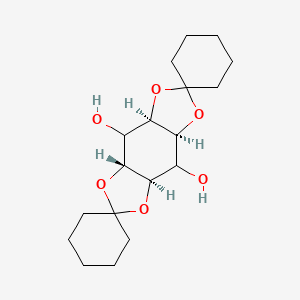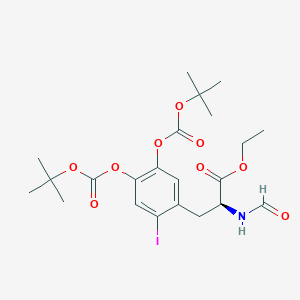
Miglitol-d4 Hydrochloride
- Click on QUICK INQUIRY to receive a quote from our team of experts.
- With the quality product at a COMPETITIVE price, you can focus more on your research.
Overview
Description
Miglitol-d4 Hydrochloride is a deuterated form of Miglitol, an oral alpha-glucosidase inhibitor. It is primarily used in scientific research as a reference substance for drug impurities and reagents . The compound is characterized by the presence of deuterium atoms, which replace hydrogen atoms in the molecule, making it useful in various analytical applications .
Preparation Methods
Synthetic Routes and Reaction Conditions
The synthesis of Miglitol-d4 Hydrochloride involves the incorporation of deuterium atoms into the Miglitol molecule. One common method includes the use of deuterated reagents during the synthesis process. For instance, the derivatization of intermediates such as N-2-hydroxyethyl glucamine and 6-(N-hydroxyethyl)-amino-6-deoxy-alpha-L-sorbofuranose is achieved using 9-fluorenylmethyl chloroformate . The reaction conditions typically involve a molar ratio of 16:1 and sodium borate at a final concentration of 0.2 mol/L at pH 8.0, 35°C for 40 minutes .
Industrial Production Methods
Industrial production of this compound often follows a chemical-biological route. This includes a biotransformation step from N-2-hydroxyethyl glucamine to 6-(N-hydroxyethyl)-amino-6-deoxy-alpha-L-sorbofuranose catalyzed by Gluconobacter oxydans resting cells, followed by a hydrogenation step to produce Miglitol .
Chemical Reactions Analysis
Types of Reactions
Miglitol-d4 Hydrochloride undergoes various chemical reactions, including:
Oxidation: The compound can be oxidized under specific conditions to form various oxidation products.
Reduction: Hydrogenation is a key step in the synthesis of Miglitol from its intermediates.
Substitution: Deuterium atoms are introduced into the molecule through substitution reactions using deuterated reagents.
Common Reagents and Conditions
Common reagents used in the reactions involving this compound include 9-fluorenylmethyl chloroformate for derivatization and sodium borate for maintaining the pH during reactions . The conditions often involve controlled temperatures and pH levels to ensure the desired reaction outcomes.
Major Products Formed
The major products formed from the reactions involving this compound include various deuterated intermediates and the final deuterated Miglitol compound .
Scientific Research Applications
Miglitol-d4 Hydrochloride is widely used in scientific research for various applications, including:
Analytical Method Development: It serves as a reference material for developing and validating analytical methods.
Quality Control: The compound is used in quality control processes, particularly in the context of Miglitol production.
Pharmacokinetic Studies: Due to its deuterated nature, it is used in pharmacokinetic studies to track the metabolism and distribution of Miglitol in biological systems.
Drug Development: It is utilized in the development of new drugs, especially for diabetes mellitus type 2.
Mechanism of Action
Miglitol-d4 Hydrochloride, like Miglitol, inhibits the breakdown of complex carbohydrates into glucose by inhibiting membrane-bound intestinal alpha-glucoside hydrolase enzymes . This results in a smaller rise in blood glucose concentration following meals, thereby improving glycemic control . The compound does not enhance insulin secretion but delays glucose absorption, reducing postprandial hyperglycemia .
Comparison with Similar Compounds
Similar Compounds
Acarbose: Another alpha-glucosidase inhibitor used to manage diabetes mellitus type 2.
Voglibose: A similar compound that inhibits alpha-glucosidase and is used in diabetes management.
Uniqueness
This compound is unique due to the presence of deuterium atoms, which provide distinct advantages in analytical and pharmacokinetic studies. The deuterium atoms make it easier to track the compound in biological systems and improve the accuracy of analytical methods .
Properties
CAS No. |
1346597-27-0 |
|---|---|
Molecular Formula |
C₈H₁₄D₄ClNO₅ |
Molecular Weight |
247.71 |
Synonyms |
2R,3R,4R,5S)-1-(2-Hydroxyethyl-d4)-2-(hydroxymethyl)-3,4,5-piperidinetriol Hydrochloride; [2R-(2α,3β,4α,5β)]-1-(2-Hydroxyethyl-d4)-2-(hydroxymethyl)-_x000B_3,4,5-piperidinetrio Hydrochloride; BAY 1099-d4; BAY-m 1099-d4; Diastabol-d4; Glyset-d4; N-(2-Hydrox |
Origin of Product |
United States |
Disclaimer and Information on In-Vitro Research Products
Please be aware that all articles and product information presented on BenchChem are intended solely for informational purposes. The products available for purchase on BenchChem are specifically designed for in-vitro studies, which are conducted outside of living organisms. In-vitro studies, derived from the Latin term "in glass," involve experiments performed in controlled laboratory settings using cells or tissues. It is important to note that these products are not categorized as medicines or drugs, and they have not received approval from the FDA for the prevention, treatment, or cure of any medical condition, ailment, or disease. We must emphasize that any form of bodily introduction of these products into humans or animals is strictly prohibited by law. It is essential to adhere to these guidelines to ensure compliance with legal and ethical standards in research and experimentation.


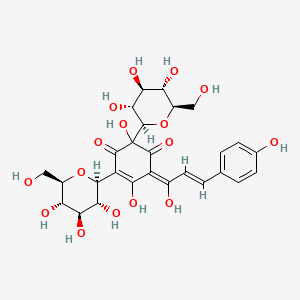
![1-[4-[[3-[[5-(2-amino-6-oxo-5H-purin-9-yl)-3-[[3-[[3-[[3-[[3-[[3-[[3-[[3-[[3-[[3-[[3-[[3-[[5-(2-amino-6-oxo-5H-purin-9-yl)-3-[[3-[[5-(2-amino-6-oxo-5H-purin-9-yl)-3-hydroxyoxolan-2-yl]methoxy-hydroxyphosphinothioyl]oxy-5-(4-amino-2-oxopyrimidin-1-yl)oxolan-2-yl]methoxy-hydroxyphosphinothioyl]oxyoxolan-2-yl]methoxy-hydroxyphosphinothioyl]oxy-5-(5-methyl-2,4-dioxo-1,3-diazinan-1-yl)oxolan-2-yl]methoxy-hydroxyphosphinothioyl]oxy-5-(5-methyl-2,4-dioxo-1,3-diazinan-1-yl)oxolan-2-yl]methoxy-hydroxyphosphinothioyl]oxy-5-(4-amino-2-oxopyrimidin-1-yl)oxolan-2-yl]methoxy-hydroxyphosphinothioyl]oxy-5-(5-methyl-2,4-dioxo-1,3-diazinan-1-yl)oxolan-2-yl]methoxy-hydroxyphosphinothioyl]oxy-5-(5-methyl-2,4-dioxo-1,3-diazinan-1-yl)oxolan-2-yl]methoxy-hydroxyphosphinothioyl]oxy-5-(4-amino-2-oxopyrimidin-1-yl)oxolan-2-yl]methoxy-hydroxyphosphinothioyl]oxy-5-(5-methyl-2,4-dioxo-1,3-diazinan-1-yl)oxolan-2-yl]methoxy-hydroxyphosphinothioyl]oxy-5-(5-methyl-2,4-dioxo-1,3-diazinan-1-yl)oxolan-2-yl]methoxy-hydroxyphosphinothioyl]oxy-5-(4-amino-2-oxopyrimidin-1-yl)oxolan-2-yl]methoxy-hydroxyphosphinothioyl]oxy-5-(5-methyl-2,4-dioxo-1,3-diazinan-1-yl)oxolan-2-yl]methoxy-hydroxyphosphinothioyl]oxy-5-(4-amino-2-oxopyrimidin-1-yl)oxolan-2-yl]methoxy-hydroxyphosphinothioyl]oxyoxolan-2-yl]methoxy-hydroxyphosphinothioyl]oxy-5-(5-methyl-2,4-dioxo-1,3-diazinan-1-yl)oxolan-2-yl]methoxy-hydroxyphosphinothioyl]oxy-5-[[[2-[[[5-(2-amino-6-oxo-5H-purin-9-yl)-2-[[[2-[[[5-(2-amino-6-oxo-5H-purin-9-yl)-2-(hydroxymethyl)oxolan-3-yl]oxy-hydroxyphosphinothioyl]oxymethyl]-5-(4-amino-2-oxopyrimidin-1-yl)oxolan-3-yl]oxy-sulfanylphosphoryl]oxymethyl]oxolan-3-yl]oxy-hydroxyphosphinothioyl]oxymethyl]-5-(5-methyl-2,4-dioxo-1,3-diazinan-1-yl)oxolan-3-yl]oxy-hydroxyphosphinothioyl]oxymethyl]oxolan-2-yl]-5-methyl-1,3-diazinane-2,4-dione](/img/structure/B1146121.png)
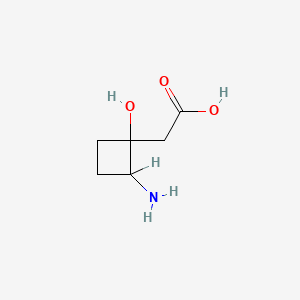
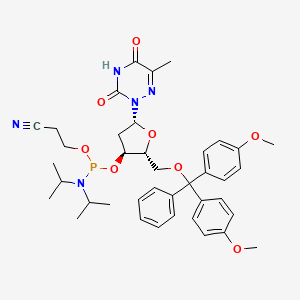
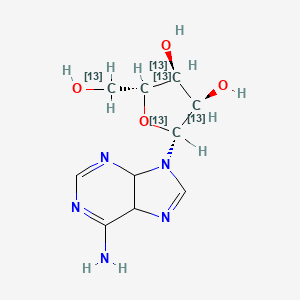
![6-Methoxy-5-[(2E)-6-methoxy-3-methyl-6-oxohex-2-en-1-yl]-7-methyl-3-oxo-1,3-dihydro-2-benzofuran-4-yl methyl 2,3,4-tri-O-acetyl-beta-D-glucopyranosiduronate](/img/structure/B1146134.png)
![2-[(2E)-2-Penten-3-yl]pyridine](/img/structure/B1146140.png)
